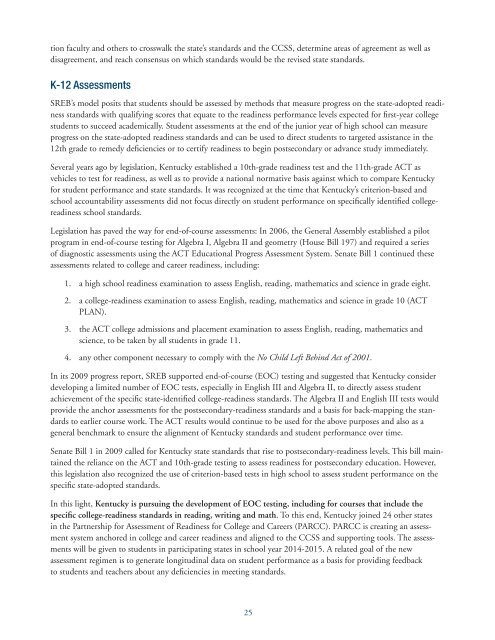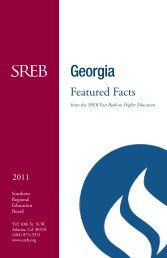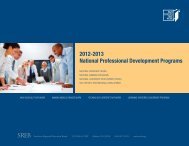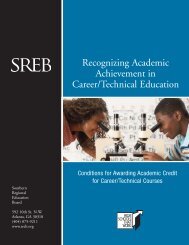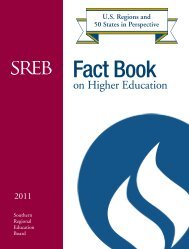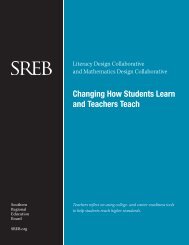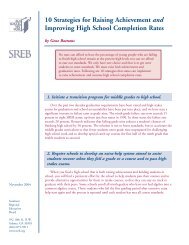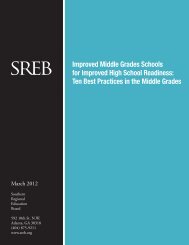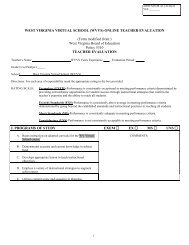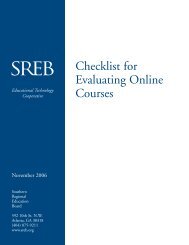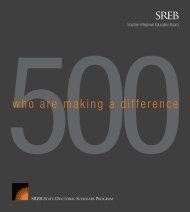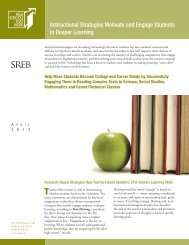Final Progress Reports - Southern Regional Education Board
Final Progress Reports - Southern Regional Education Board
Final Progress Reports - Southern Regional Education Board
Create successful ePaper yourself
Turn your PDF publications into a flip-book with our unique Google optimized e-Paper software.
tion faculty and others to crosswalk the state’s standards and the CCSS, determine areas of agreement as well as<br />
disagreement, and reach consensus on which standards would be the revised state standards.<br />
K-12 Assessments<br />
SREB’s model posits that students should be assessed by methods that measure progress on the state-adopted readiness<br />
standards with qualifying scores that equate to the readiness performance levels expected for first-year college<br />
students to succeed academically. Student assessments at the end of the junior year of high school can measure<br />
progress on the state-adopted readiness standards and can be used to direct students to targeted assistance in the<br />
12th grade to remedy deficiencies or to certify readiness to begin postsecondary or advance study immediately.<br />
Several years ago by legislation, Kentucky established a 10th-grade readiness test and the 11th-grade ACT as<br />
vehicles to test for readiness, as well as to provide a national normative basis against which to compare Kentucky<br />
for student performance and state standards. It was recognized at the time that Kentucky’s criterion-based and<br />
school accountability assessments did not focus directly on student performance on specifically identified collegereadiness<br />
school standards.<br />
Legislation has paved the way for end-of-course assessments: In 2006, the General Assembly established a pilot<br />
program in end-of-course testing for Algebra I, Algebra II and geometry (House Bill 197) and required a series<br />
of diagnostic assessments using the ACT <strong>Education</strong>al <strong>Progress</strong> Assessment System. Senate Bill 1 continued these<br />
assessments related to college and career readiness, including:<br />
1. a high school readiness examination to assess English, reading, mathematics and science in grade eight.<br />
2. a college-readiness examination to assess English, reading, mathematics and science in grade 10 (ACT<br />
PLAN).<br />
3. the ACT college admissions and placement examination to assess English, reading, mathematics and<br />
science, to be taken by all students in grade 11.<br />
4. any other component necessary to comply with the No Child Left Behind Act of 2001.<br />
In its 2009 progress report, SREB supported end-of-course (EOC) testing and suggested that Kentucky consider<br />
developing a limited number of EOC tests, especially in English III and Algebra II, to directly assess student<br />
achievement of the specific state-identified college-readiness standards. The Algebra II and English III tests would<br />
provide the anchor assessments for the postsecondary-readiness standards and a basis for back-mapping the standards<br />
to earlier course work. The ACT results would continue to be used for the above purposes and also as a<br />
general benchmark to ensure the alignment of Kentucky standards and student performance over time.<br />
Senate Bill 1 in 2009 called for Kentucky state standards that rise to postsecondary-readiness levels. This bill maintained<br />
the reliance on the ACT and 10th-grade testing to assess readiness for postsecondary education. However,<br />
this legislation also recognized the use of criterion-based tests in high school to assess student performance on the<br />
specific state-adopted standards.<br />
In this light, Kentucky is pursuing the development of EOC testing, including for courses that include the<br />
specific college-readiness standards in reading, writing and math. To this end, Kentucky joined 24 other states<br />
in the Partnership for Assessment of Readiness for College and Careers (PARCC). PARCC is creating an assessment<br />
system anchored in college and career readiness and aligned to the CCSS and supporting tools. The assessments<br />
will be given to students in participating states in school year 2014-2015. A related goal of the new<br />
assessment regimen is to generate longitudinal data on student performance as a basis for providing feedback<br />
to students and teachers about any deficiencies in meeting standards.<br />
25


